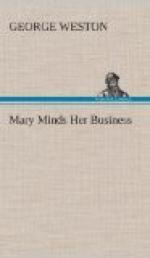“Here comes Helen,” said Mary with just the least trace of wickedness in her voice. “She’ll do her best, I’m sure.”
Helen was dressed for the evening, her arms and shoulders gleaming, her coiffure like a golden turban.
“Mary hardly ever dresses any more,” she said as she came down the stairs, “so I feel I have to do double duty.”
On the bottom landing she stopped and with extravagant motions of her body sang the opening lines of the Bedouin’s Love Song, Wally joining in at last with his plaintive, passionate tenor.
“If you ever lose your money, Wally,” she said, coming down the remaining stairs, “we’ll take up comic opera.” Curtseying low she simpered, “My lord!” and gave him her hand to kiss.
“She knows how to handle men,” thought Mary watching, “just as the women at the factory know how to handle metal. I wonder if it comes natural to her, or if she studies it by herself, or if she learned any of it at Miss Parsons’.”
She was interrupted by a message from Hutchins, the butler. The spread of the strike had been flashed out by the news association early in the afternoon, and the eight-ten train had brought a company of reporters.
“There are half a dozen of them,” said Hutchins, noble in voice and deportment. “Knowing your kindness to them before, I took the liberty of showing them into the library. Do you care to see them, or shall I tell them you are out?”
Mary saw them and they greeted her like old friends. It didn’t take long to confirm the news of the strike’s extension.
“How many men are out now?” one of them asked.
“About fifteen hundred.”
“What are you going to do when you have used up all your local women?” asked another.
“What would you do?” she asked.
“I don’t know,” he replied. “I guess I’d advertise for women in other cities-cities where they did this sort of thing during the war.”
“Bridgeport, for instance,” suggested another.
“Pittsburgh—there were a lot of women doing machine work there—”
“St. Louis,” said a fourth. “Some of the shops in St. Louis were half full of women—” With the help they gave her, Mary made up a list.
“Even if you could fill the places locally,” said the first, “I think I’d get a few women from as many places as possible. It spreads the idea—makes a bigger story—rounds out the whole scheme.”
After they had gone Mary sat thoughtful for a few minutes and then returned to the drawing room. When she entered, Helen and Wally were seated on the music bench, and it seemed to Mary that they suddenly drew apart—or if I may express a distinction, that Wally suddenly drew apart while Helen played a chord upon the piano.
“Poor Wally,” thought Mary a little later. “I wish he wouldn’t look like that when he sings.... Perhaps he feels like I felt this spring.... I wonder if Ma’m was right.... I wonder if people do fall in love with love....”




